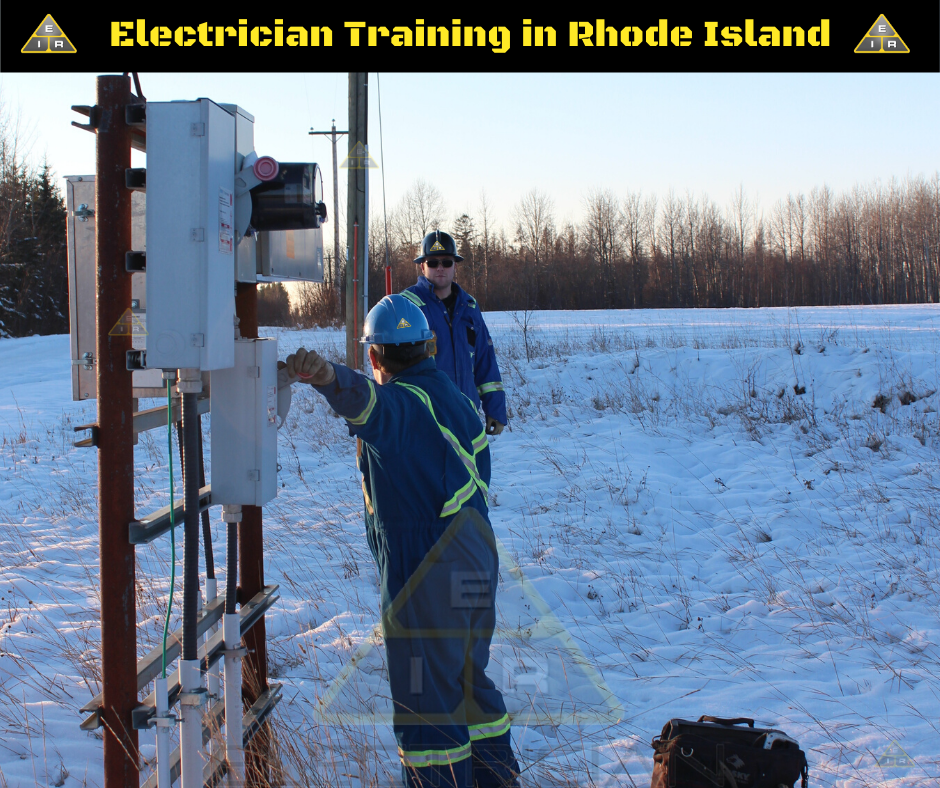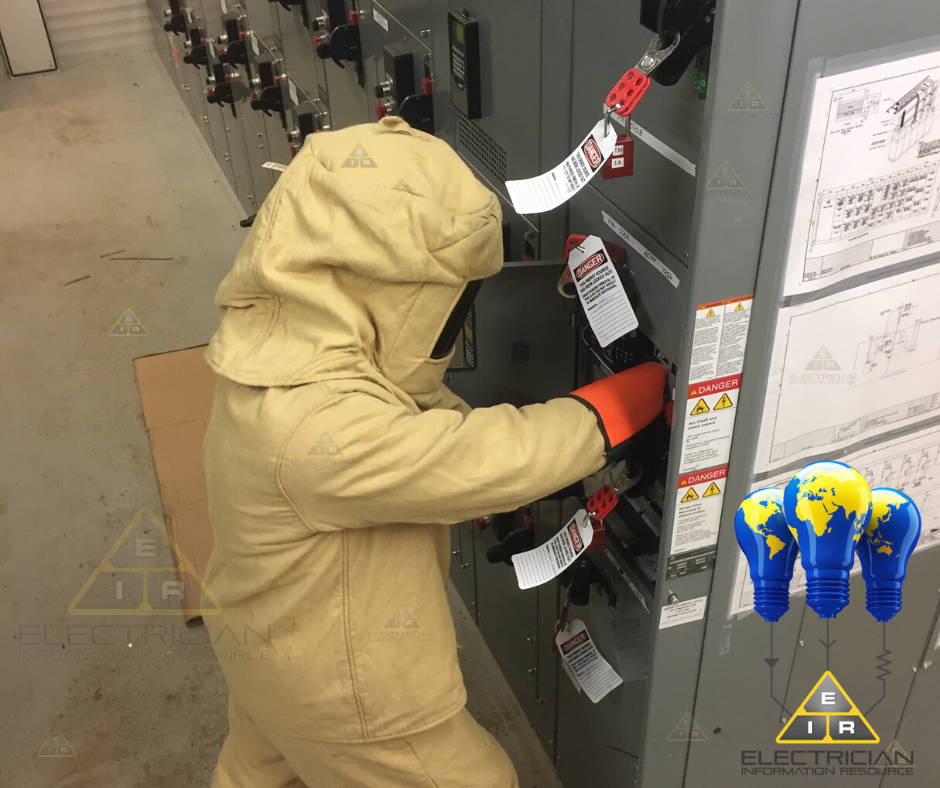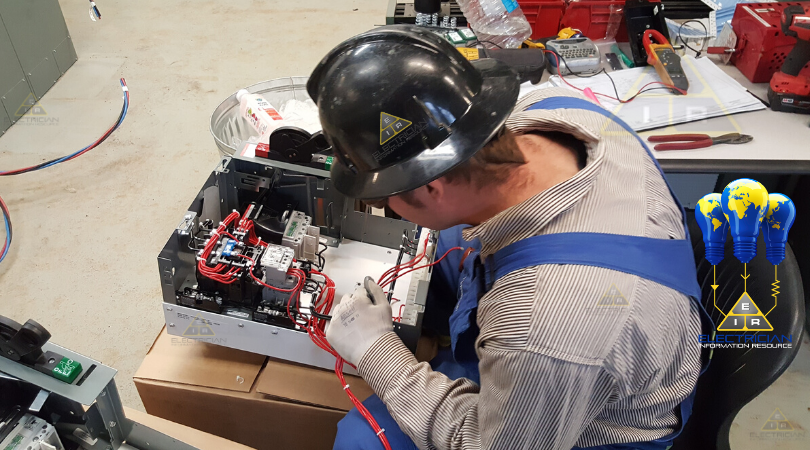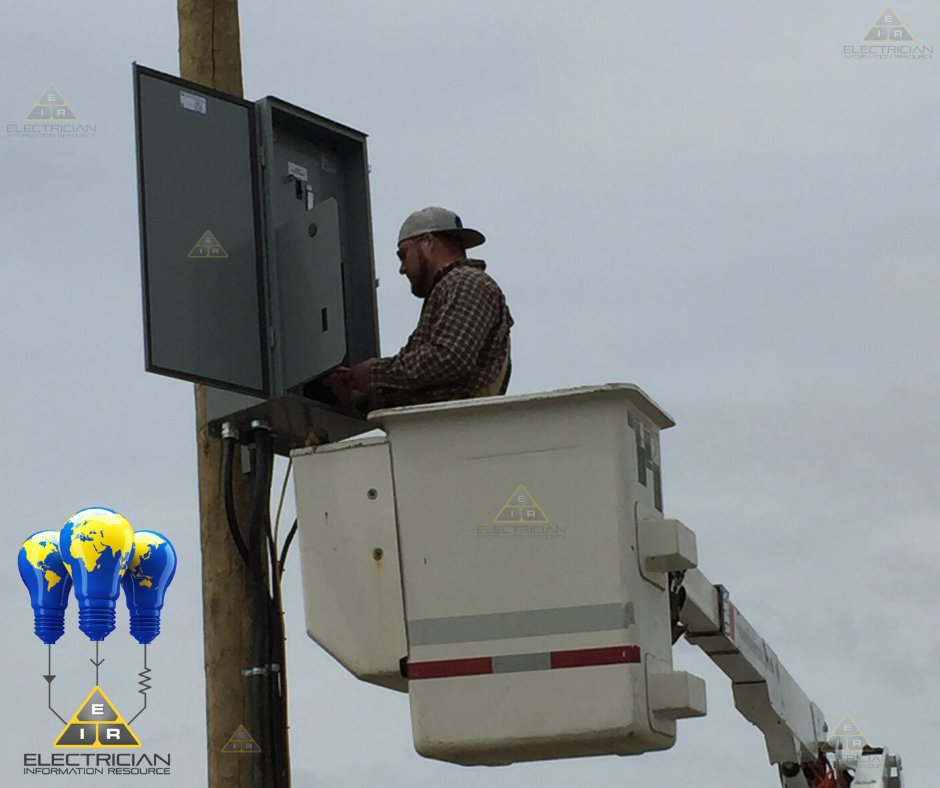Electrician Training in Rhode Island | How To Become An Electrician

Are you looking for electrician training in Rhode Island? Do you want a career that will guarantee you a blissful retirement life with plenty of money to spend? If so you are in the right place.
According to the Bureau of Labor and Statistics, electricians in Rhode Island are one of the best paid in the country. Electrical engineers have an average annual wage of $110,360 which more than enough to afford you a holiday trip to the Caribbean. The demand for electricians is projected to increase by 22.8% until the year 2024. This is according to the Rhode Island Department of Labor and Training.
To better understand the economic importance of being an electrician, we have decided to compare the annual wage with other professions. Keep in mind that this is based on government data provided by the Bureau of Labor Statistics;
Plumbers - $34,000/year
Glaziers - $41,180/year
Tile Installers - $40,000/year
Construction - $47,030/year
The menu below will enable you to quickly go through this article and enlighten you on what is needed to tour the world.
Getting the Job Experience Required to Become a Journeyman
The first step to becoming a qualified electrician is becoming a Journeyman. According to the Department of Labor and Training Division, a class B journeyman license will require you to meet the following qualification;
- Have a classroom training of 576 hours
- Have a job experience of 8,000 hours {Equivalent to four years}
Though this is not a formal requirement all electricians must conform to the National Electrical Code
National Electrical Code
The national electrical code is a set of standards that every electrician must adhere to, to ensure their safety while installing electrical wires. This code is important not only in ensuring the safety of electricians but also in ensuring that electrical training in Rhode Island is standardized with the rest of the world.
In most states, you will be required to attend classroom hours and study the national electrical code before your license is renewed.
If you are employed as a maintenance worker in a school or a hospital, the Department of Labor and Training Division will issue you with a Limited Journeyman License. The license restricts the holder from installing new electrical wires but allows for maintenance or repairing of already installed wires.
To gain the required minimum hours to get a journeyman license, you can participate in the following programs;
- Join a Technical School
- Join a Union Apprenticeship Program
- Join a non-union Apprenticeship Program

Electrician Training in Rhode Island Through a Technical School
This is the best approach to those without an electrical background. It also gives you an advantage in the sense that you will graduate with an Associate’s Degree in Electrical Technology and also meet the minimum classroom hours required to seat for a journeyman exam.
Expect to learn the following subjects once you join a technical school;
- Motors
- Building Automation
- Low voltage Systems
- Fabrication
- Conduit Bending
- Blueprint Reading
- Photovoltaic systems
- First Aid /OSHA
- Test instruments
- National Electrical code
- Transformer Principles
Another advantage of attaining an undergraduate certificate is that your local school can find an apprenticeship position for you. By joining an apprenticeship position, you will gain the mandatory work hours required by the department and also earn a yearly wage of $32,398.
Electrician School in Rhode Island Through a Union Apprenticeship Program
A union apprenticeship is facilitated through the Joint Apprenticeship and Training Committee {JATC}. This program is affiliated with the international Brotherhood of Electrical Workers {IBEW}. IBEW works together with the National Electrical Contractors Association {NECA} to offer this program. To enroll for the program, an applicant must meet the following requirements:
- Pass an aptitude test
- Have a high school degree
- Have a valid driver’s license
- Have original copies of your high school transcripts
An apprenticeship program must fulfill two requirements;
- Have a classroom course
- Offer job training to the apprentice
A union apprenticeship negotiates for your salary based on the market conditions. By the time you finish your apprenticeship, you should be well versed in Electrical systems and National Electrical Codes.
The only downside of joining a union apprenticeship program is that the union limits the number of people who can join the program at a go.
Become an Electrician Through a Non-Apprenticeship Program
This arrangement is almost similar to that of a union apprenticeship. The main difference is that as a non-union member your salary is not negotiated by the union. Rather, the “shops” will decide on how much to pay you based on what other ‘shops’ are paying their apprentices. The main disadvantage of this arrangement is that you may be underpaid when compared to market rates in other areas.
In Rhode Island, the association of Builders and Contractors INC {ABC} and the Independent Electrical Contractors are responsible for offering non-union apprenticeship programs to aspiring electricians.
2. Sitting for a Journeyman Exam
Once you have met the minimum criteria required by the Department of Labour and Training you can fill this form. The following rules must also be adhered to when filling out the form;
- The form must be completed and notarized
- A government issued ID should be attached
- Show Proof of experience
- Pay an application fee of $75 in the form of a money order or a check
- Have a notarized statement indicating your work experience
- The application should have an attached apprenticeship completion certificate issued by the Department of Labor & Training
- A Master electrician signed ratio sheet
If the body accepts your application, it will send you information on when and how to prepare for the exam. The exam will cover the following subjects;
- Electrical cables
- Electrical wires
- Bid preparation
- Blueprint reading
- Electrical panel boards
- Grounding
- Electrical connections
- Branch circuits
- Sign installation
- Motor controls
- Communication and Electrical transmission lines
- Electrical Equipment
- National electrical codes
- Voltmeters, Ohmmeters and Ammeters
- Fire alarm systems, protected premises, Fundamentals
- Maintenance, Testing and Alarm inspections
- Control functions and interface, Emergency Alarm, Communication Systems
- Electrical Miscellaneous, Currents, Panels, Wires
- Formulas, Calculations, Mathematics
- Safety, Asbestos, Code of federal regulations
- Insurance and Safety
- Employees and Labor

The pass mark for this exam is 70%. Once you get the license your electrician training in Rhode Island should not stop because you will not be eligible to renew it. To be eligible, you should ensure that you have at least 15 hours of classroom training.
Unlike before when you were an apprentice, you can now work with little or no supervision. Your new Job responsibilities will be;
- Repairing electrical wires or devices
- Testing the efficiency of electrical systems using an oscilloscope or other tools such as voltmeter
- Using a blueprint or a testing device to determine the next course of action
- Adhering to safety guidelines such as OSHA
- Reporting safety violations to the supervisor
- Working on electrical systems in a commercial or residential building using a ladder, elevator or any other lifting tool
Expected Salary
Expect the starting salary to be around $26.38 an hour. This should translate to about $54, 800 a year.
3. Becoming a Master Electrician
As a master electrician expect to earn an hourly wage of $65,400. This is the last step before you get the coveted title of an Independent electrician. To apply for a master electrician license you will need to pay a fee of $240 and meet these two qualifications:
- Must have a valid Journeyman License
- Have a working experience of 6 years
To apply for the exam, an application must be sent to the Rhode Island Department of Labor and Training. A Master electrician exam will test you on the following subjects;
- Conductors, Voltage and Heaters
- Branch Circuits
- Electrical cables and Raceways
- NEC
- Electrical equipment
- Voltmeters and Ohmmeters
- Communication lines and electrical lines
- Fire alarm systems
- Maintenance and Testing
- Photovoltaic
- Mathematical formulas and Calculation
- Code of federal regulations
- Electrical Miscellaneous
- Insurance and Safety
- Bid preparation
- Blueprint reading

Master Electrician Skills and Duties
Once you graduate and become a master electrician, your job duties will change unlike when you were a journeyman. Your new duties will be;
- To repair and test electrical circuits
- Supervise journeymen
- Monitor the effectiveness of installed electrical equipment
- Update electrical panel schedules
- Making recommendations on fire safety
The following Skills are required for you to become a successful Master electrician;
- Good judgment
- Ability to enforce safety procedures and make a recommendation
- Ability to use diagnostic equipment
- Ability to train lower-ranking electricians
- Ability to read commercial electrical blueprints
A master electrician’s salary is renewed every 24 months and it must be done before the license expires or a $12 fee will be charged as penalty.
4. Becoming an Independent Contractor
At this stage, you have years of electrical training that increases your market value. If you become a master electrician be prepared to go on a holiday trip because the salary will blow you away. You will also be able to bid for multi-million dollar projects that will increase your earnings by more than 100%.
The main benefits of been an independent contractor are;
- You will work without supervision
- You will earn high wages
- You will be able to start your own electrical company
- Higher wages assure you of a comfortable retirement
The two main requirements required before you can sit for an independent electrician license are;
- Have a minimum experience of 6 years
- Have a minimum journeyman experience of 2 years
The first step is to fill out an application and submit it to the Department of Labor and Training. Once they accept your application, they will notify you on when to sit for the exam. Once you get the license keep in mind it must be renewed at least every two years.
5. Salaries, Job Outlook and Licensing Fees
According to the Bureau of Labor Statistics, electrician careers is projected to grow by 22.8% until the year 2024. It is also projected that the county will have 2,730 electricians by 2024. Electrician salaries depend on the level of education and experience.
Average Salaries in Different Sectors
- Electrical and Electronics Repairers: $40,000 - $55,903
- Power-line Installers and Repairers: $63,970 - $96,700
- Electricians Specializing in Commercial and Industrial Equipment: $48,810 - $63,500
- Fire Alarm Installers: $48,000 - $75,000

Electrician Salaries in Providence-Warwick
Providence-Warwick RI-MA: $30,400
Hourly Wage of Electricians in Rhodes Island
- Electromechanical Assemblers: $22.54
- Power line Installers and Repairers: $41.65
- Home Entertainment Equipment Installers & Repairers: $23.28
- Fire Alarm Installers: $23.28
- Commercial & Industrial Equipment Electricians: $31.64
- Electrical Engineers: $64.26
Electrician Fees in Rhodes Island
The following fees are charged by the department of labor and training;
- Electric Sign Installer: $72
- Master Oil Burner Electrician: $240
- Corporation: $200
- Master Electrician: $240
- Journeyman Electrician: $72
- Limited Electricians: $240
- Corporation {EC}: $200
- Electrical Sign Contractor: $240
Enrolling for electrician training in Rhode Island is an exciting and fulfilling journey. Every step opens new doors for you to become an electrician.








